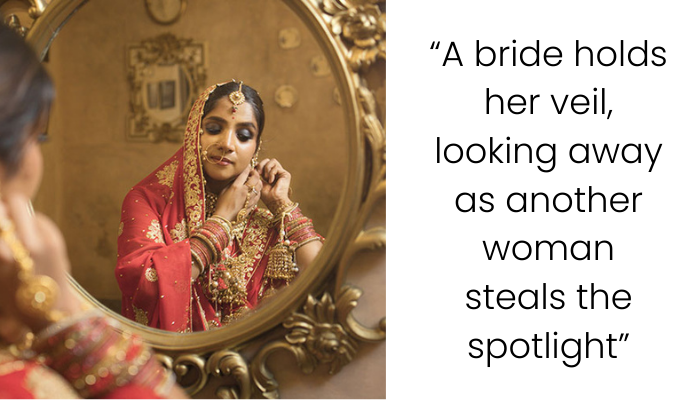When the Sister‑in‑Law Plays “Bride” Too: A Story of Wedding Drama & Boundaries
I had such high hopes for my wedding ceremony. I found a white and pink dress I loved—something special for my Indian wedding ceremony. My sister‑in‑law (SIL) was with me when I picked it out. She also found a red dress—very similar design—and I asked my parents to ask her not to wear it for the ceremony because red is super bridal in our culture. She agreed.
But a month before the wedding, I found out she was still planning to wear the red dress. I tried to talk it out with her. She defended it, saying “pictures wo n’t look good at night but better during the day” (all our events were outdoors). She’d also asked me to do a pastel color theme—and then pick a jewel tone red for herself. Classic.
The wedding itself was a mix: so many beautiful moments with my husband, family, and friends. But also tension. My SIL demanded attention from the photo‑video team, confronted a bridesmaid, skipped the glam we arranged for her, etc. She didn’t wear the red dress for the ceremony, thankfully. But at the reception? She did. Then she left early. After everything, she started posting on social media—her MUA calling her a “bride,” tagging the venue, etc. It hurt. My brother didn’t stand up for me, said I was being unreasonable. I’m married now, trying to heal, move on, but the fallout from her behavior still stings deep.
No one wants a tension-filled wedding ceremony
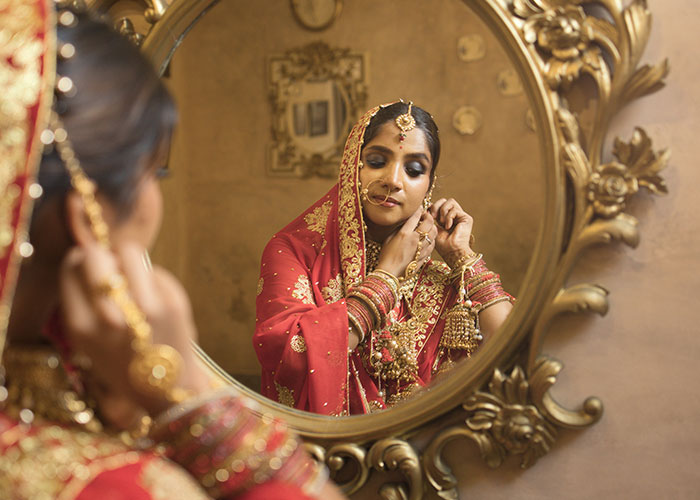
Unfortunately for this bride, her big day had been marred by drama, thanks to her sister-in-law


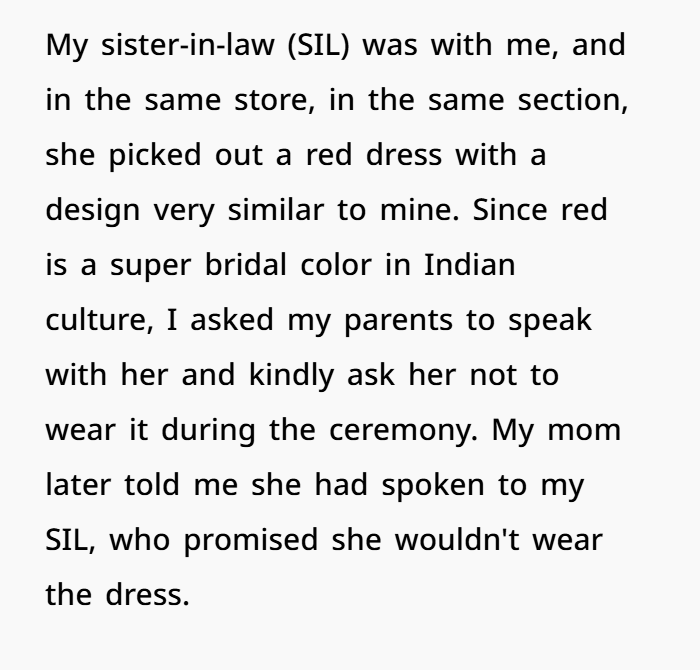
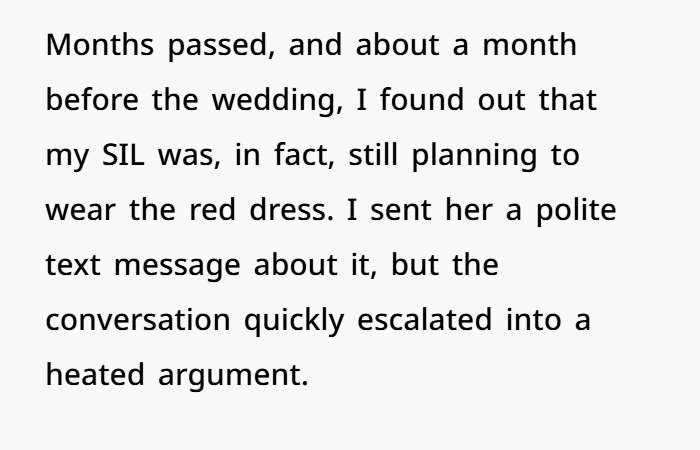
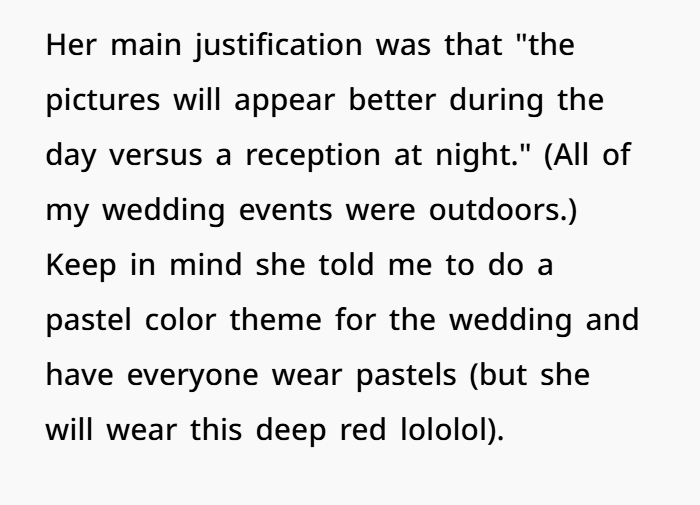

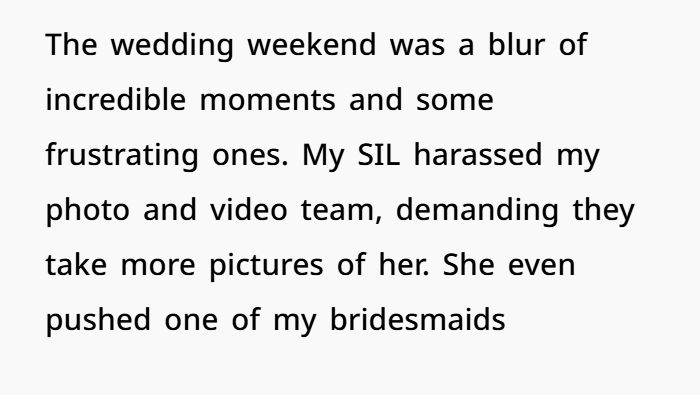


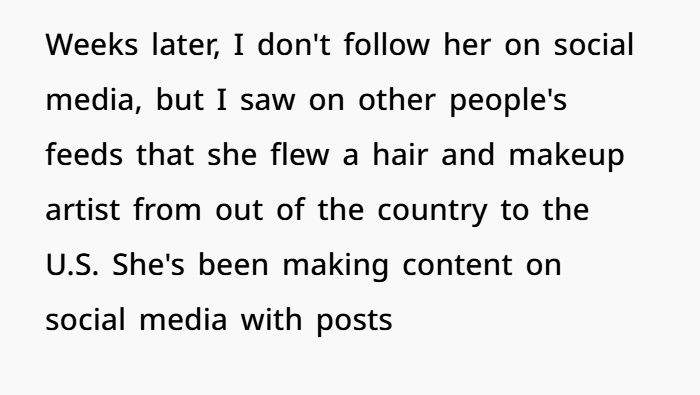
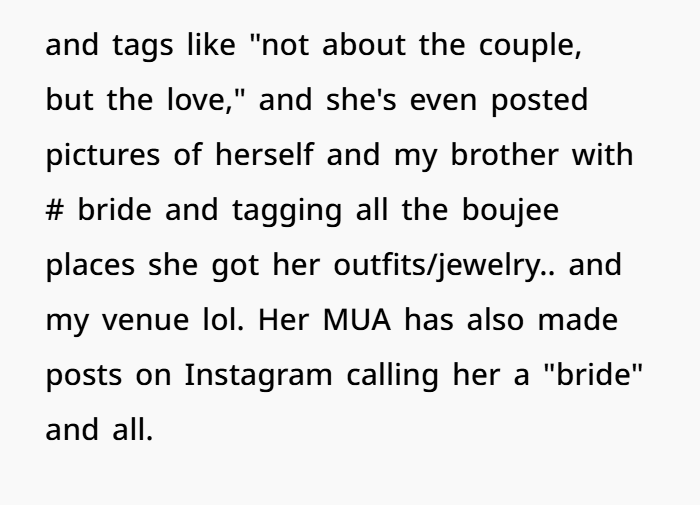

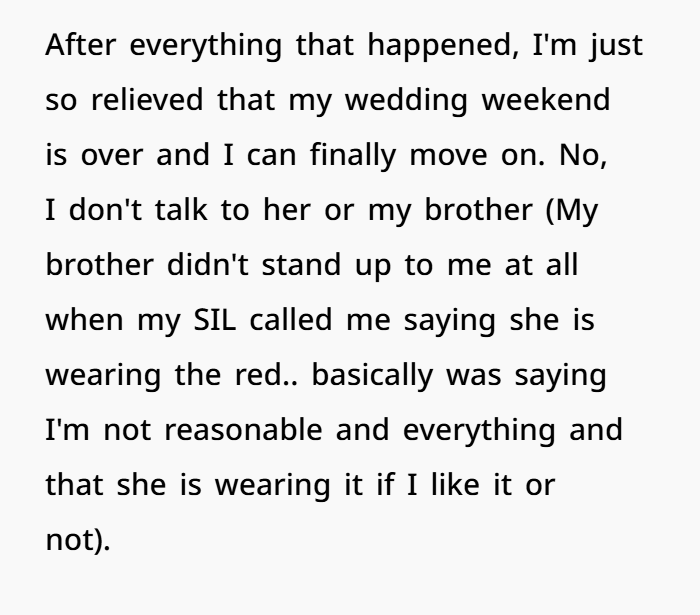
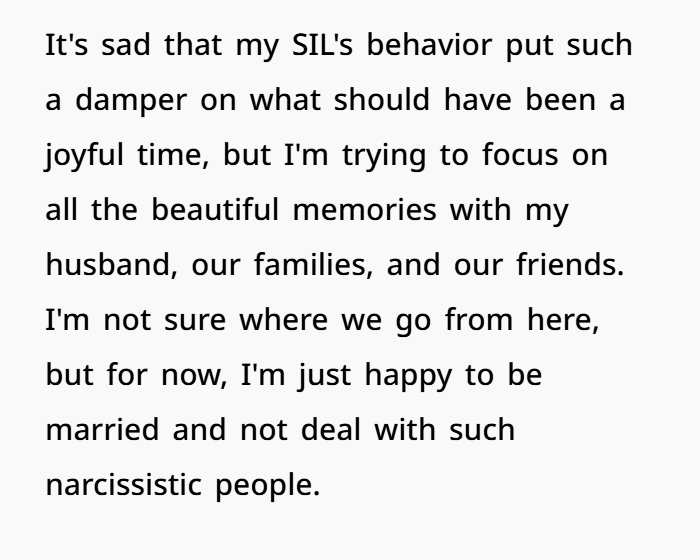
This kind of drama, though painful, reveals a lot about wedding dynamics, family boundary‑issues, cultural norms, and psychology. I want to unpack it, both for me and for anyone else who might face something similar.

1. Weddings magnify unresolved family issues
Wedding planning tends to expose existing cracks. According to multiple studies in psychology / family therapy, major life events (marriages, births, deaths) almost always amplify underlying tensions. If there are issues of validation, jealousy, power, or control in place, they become more visible.
In your case, the SIL’s actions—choosing a similar dress, ignoring promises, creating content as “the bride”—all suggest she may have been trying to claim some share of the spotlight. Whether intentional or subconsciously, it’s about recognition and attention. Weddings are high‑stakes for identity. Many people feel invisible in family systems unless they assert themselves strongly. Your boundary (asking her not to wear red) clashed with that need for visibility.
2. Cultural & Symbolic Importance of Dress Colors
In many South Asian cultures, red is deeply symbolic. It often represents marriage, auspiciousness, celebration. When multiple people wear bridal red or similar tones, it can cause confusion or feel like someone is trying to “upstage” the bride. The couple usually expects to be the center of attention in dress, décor, ritual. So agreeing on colour palettes, themes, or even having a dress code is common.
Etiquette guides also suggest avoiding “attention‑grabbing” colors if asked by the bride. Wedding planners often warn that bold or jewel tones—especially red—can distract in photos or clash with aesthetic themes. A Newsweek article even noted how wearing red can be frowned upon for being too flashy, and sometimes people believe (in some traditions) that red at weddings may imply something more scandalous. Newsweek

So your request was reasonable under cultural etiquette and personal expectations. The promise from SIL made it fair: she knew beforehand and agreed. That makes her later behavior a breach of trust.
3. Boundaries, promises, and escalation
You did many things right: asking ahead of time, involving your parents, letting her promise, then addressing it again when you saw she was planning to break the promise. Conflict escalation is often about broken boundaries.
When boundaries are violated (dress, behaviour in front of photo/video team, pushing a bridesmaid), it’s painful. The emotional toll is heavy, especially when your partner (your brother) doesn’t support you. That complicates things. In many “wedding drama” reports, the spouse or sibling being passive or siding with the problematic party leaves the bride feeling outraged but isolated.
Research on conflict resolution suggests that early, direct communication helps; but when it’s ignored, it gets more tense. Emotions run high. What’s key is protecting one’s emotional health: know your bottom line (what you won’t compromise), and share that with trusted support. It seems you did that.
4. Social media + content creation = extended conflict
Because of social media, it’s no longer just what happens that weekend—it’s what happens after. SIL making content, using tags like “bride,” posting with your venue, having her makeup artist also calling her “bride” etc., drags the conflict into digital space. That can feel like gaslighting—or taunting—because the public impression might twist things.
In recent years, countless stories (on Reddit, in news) show that when someone uses social media to “play bride,” it often escalates hurt and misinterpretation. The visual and public element can transform private hurt into performance. That worsens feelings of betrayal: it’s not just what she did at the wedding, but what she continues to do after.
5. Healing & next steps

While weddings are moments in time, the consequences linger. Healing involves:
- Acknowledging your feelings: anger, hurt, disappointment are valid.
- Possibly limiting contact if repeated boundary violations happen. If your brother didn’t support you, talking with him later when emotions cool might help—but you also get to decide if reconciliation is safe/healthy.
- Reclaiming your narrative: you are the bride. Your memories, your joy, your photos reflect you and your husband. The negative things don’t erase all the beauty.
- Self‑care: emotionally and mentally. Talking to friends, maybe a counselor if the hurt feels overwhelming. Doing things that feel affirming.
6. What people say & legal precedent / family therapy insights
- In family therapy, sibling rivalry is a common theme. When one sibling marries, inheriting new roles, power shifts, often jealousy or competition emerges. Therapeutic models suggest exploring underlying insecurities or family expectations.
- Studies in social etiquette note that wedding guests often feel pressure to conform to bride/Groom preferences regarding dress, color themes, photo, etc. The “host’s wishes” are part of polite culture. When guests break them, it’s often seen as disrespectful—even if the guest doesn’t personally believe in the expectations.
- Although this isn’t legal territory (unless something becomes defamation or harassment), there is precedent for “emotional abuse” or “hostile family situations” in psychological research. Boundaries are important. The failure of your brother to stand up for you may be a breach of familial responsibility, though not legally actionable. It’s more about trust.
People in the comments had their questions and pieces of advice, as many of them sympathized with the author






What you went through sucks. It feels unfair and hurtful. But you did your best: you set boundaries, you asked, you communicated. The promise from your SIL was meaningful. When she broke it, she crossed a boundary. That doesn’t invalidate your feelings or your wedding. The good memories you have—those count. You’re allowed to protect your peace. You deserve respect, especially from family.
If you want, I could help you write something (an honest message? maybe a post?) addressing this with your brother or SIL, or ways to possibly patch the relationship if you choose to. Do you want me to draft something?

